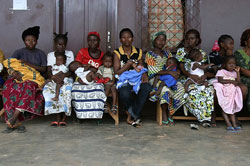
Top stories

Marketing & MediaCould an alcohol ad encourage children to climb into washing machines?
Karabo Ledwaba 7 hours





More news














According to the United Nations nearly eight million children die of preventable diseases every year[1]. The World Health Organisation adds that around 70% of these deaths are due to conditions that could be prevented or treated with access to simple, affordable interventions[2].
Aiming to reduce infant mortality Philips AVENT is educating mothers to increase awareness of hygiene routine and breastfeeding. Bacterial diarrhoea is one of the major causes of infant mortality in Africa; with proper sterilisation routines of feeding equipment and longer breastfeeding cycle, we can achieve significant improvement in mother and child care.
"Philips has been dedicated to addressing the needs of mothers and children for over 40 years and recognises that mothers, newborn babies and children represent the well-being of a society and its potential for the future. Their health needs cannot be left unmet without harming the whole of society," says Paul Hobden SO Leader Philips Consumer Lifestyle South Africa.
Sterilisation plays a vital role in reducing the risk of infection in infants, as infections are the primary cause of infant mortality in Africa. To help support healthcare workers in their efforts to educate mothers about the importance of sterilisation, Philips AVENT will be supporting healthcare centres with 50 Electric Steam Steriliser around the country, including the Medical Research Council in KwaZulu Natal and the Department of Health (Overberg region: Swellendam Sub-district). Philips AVENT will also issue information featuring tips on sterilisation and breastfeeding to physicians and healthcare professionals in government and private clinics to help them educate mothers and mothers-to-be.
Another fundamental factor in reducing infant mortality is educating mothers on the benefits of breastfeeding. According to the World Health Organisation (WHO), exclusive breastfeeding for a baby's first six months reduces a child's chances of succumbing to a number of preventable illnesses including diarrhoea and acute respiratory tract infections, two leading causes of infant mortality. This is why the World Health Organisation recommends exclusive breastfeeding for this period and partial breastfeeding into a child's second year[3].
"Breastfeeding has been recognised for most of human history, to be crucial for infant survival and offers significant benefits for mothers and babies," says Dr Diana du Plessis, Independent Midwifery Consultant (D.Cur Midwifery & Neonatology).
In a recent survey done by Philips, it was found that the vast majority of urban South African mothers (82%) do breastfeed. However, nearly a quarter (22%) stops after three months, while 26% continue to 12 months and 22% continue until 18 months.
To educate and empower South African women to continue breastfeeding, Philips AVENT will also be contributing to improve mother and child's health with 1000 Manual Breast Pumps and 1 000 Nipple Protectors to carefully-selected healthcare providers including a Newborn Care unit in Limpopo Province.
"Philips AVENT is a willing partner in this initiative and will contribute resources, educational strategies, time and effort to promote breastfeeding to save newborns in Africa," says Dr Plessis.
The Philips AVENT range of products is distributed by Fountain Medical. For more detailed product information and stockist details, e-mail az.oc.seibab@niatnuof or contact tel: +27 (0) 11 782 7688.
[1] (Levels & Trends in Child Mortality: Report 2010." United Nations Inter-Agency Group on Child Mortality Estimation. Maternal estimates from United Nations inter-agency estimates based on 2010 data. Source: WHO Fact sheet N°178.
[3] Source: WHO Fact sheet N°342.
For more information please follow the Cape Town to Cairo roadshow on:
[[www.philips.com/africaroadshow.